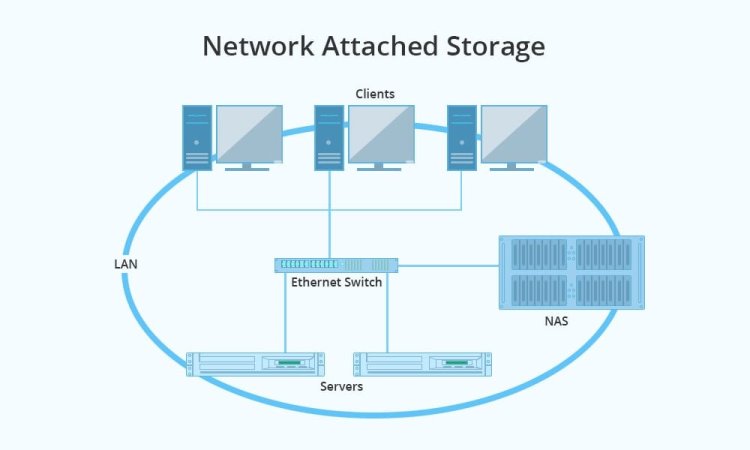Network Attached Storage (NAS) Empowering Efficient Data Storage and Sharing
In today's digital age, the need for efficient data storage and sharing solutions has become paramount. Network Attached Storage (NAS) has emerged as a versatile and cost-effective solution for individuals and businesses alike. By providing a centralized storage platform accessible by multiple devices over a network, NAS offers convenient data management, secure file sharing, and robust backup capabilities. In this article, we will explore the concept of NAS, its benefits, key features, and its applications in various scenarios.

What is Network Attached Storage (NAS)?
Network Attached Storage, commonly known as NAS, refers to a dedicated storage device connected to a computer network. Unlike traditional external hard drives or cloud storage services, NAS operates independently and is not tied to a specific computer. It functions as a file server, allowing multiple users to access and share data simultaneously. NAS devices typically consist of one or more hard drives configured in a RAID (Redundant Array of Independent Disks) array for improved data redundancy and protection.
Benefits of NAS
1. Centralized Data Storage and Management
One of the primary advantages of NAS is centralized data storage. With NAS, you can consolidate all your important files, documents, media, and backups in a single location. This makes it easier to organize and manage your data, eliminating the need for multiple storage devices and reducing clutter.
2. Data Accessibility and Sharing
NAS allows seamless data accessibility and sharing across multiple devices and platforms. Whether you're at home, in the office, or on the go, you can access your files from any device connected to the same network. This enables efficient collaboration and file sharing among team members or family members, enhancing productivity and convenience.
3. Data Backup and Disaster Recovery
NAS provides robust backup and disaster recovery capabilities. With built-in RAID configurations, you can set up automatic backups and ensure data redundancy, minimizing the risk of data loss. In the event of a hardware failure or accidental deletion, NAS allows for quick data recovery, ensuring business continuity and peace of mind.
4. Scalability and Flexibility
NAS offers scalability, allowing you to expand your storage capacity as your needs grow. Most NAS devices support the addition of extra hard drives or the upgrading of existing drives without data loss. Additionally, NAS systems provide flexibility in terms of accessing and managing data, offering various protocols such as SMB, AFP, FTP, and WebDAV.
Key Features of NAS
1. Multiple Drive Bays and RAID Support
NAS devices typically come with multiple drive bays, allowing you to install multiple hard drives or SSDs. This facilitates data redundancy and improved performance through RAID configurations, such as RAID 0, RAID 1, RAID 5, or RAID 10.
2. Remote Access and Cloud Integration
NAS enables remote access, allowing you to access your files and manage your NAS device from anywhere with an internet connection. Many NAS systems also offer cloud integration, enabling seamless synchronization with popular cloud storage services.
3. Data Protection and Security
NAS devices often include advanced data protection and security features. These may include built-in encryption, user access controls, firewall protection, and support for secure remote connections (SSL/TLS). These features ensure that your data remains secure and protected from unauthorized access.
4. Media Streaming and Multimedia Applications
Some NAS devices include media streaming capabilities, allowing you to stream multimedia content, such as videos, music, and photos, to compatible devices like smart TVs, gaming consoles, or mobile devices. This turns your NAS into a multimedia hub, providing centralized access to your entire media library.
Applications of NAS
1. Home Media Server
NAS can serve as a home media server, allowing you to store and stream media files to various devices within your home network. Whether you want to enjoy movies on your smart TV, listen to music on your stereo system, or view photos on your tablet, a NAS simplifies media sharing and enhances your home entertainment experience.
2. Small Business File Sharing and Collaboration
For small businesses, NAS serves as a reliable platform for file sharing and collaboration. Team members can access and collaborate on files stored on the NAS, promoting efficient workflow, version control, and data consistency. NAS also offers secure remote access, enabling employees to work from anywhere without compromising data security.
3. Personal Cloud Storage
NAS provides an alternative to relying solely on public cloud storage services. With a personal NAS, you can create your own private cloud, giving you full control over your data, privacy, and access. This is particularly useful for individuals and businesses with sensitive or confidential information that requires an extra layer of security and privacy.
4. Backup and Disaster Recovery
NAS is an ideal solution for backup and disaster recovery purposes. By setting up automatic backups to your NAS device, you can ensure that your critical data is protected in case of hardware failure, accidental deletion, or other unforeseen events. NAS devices also offer features like snapshotting, which allows you to take point-in-time backups for quick recovery.
Also Check XP-PEN Artist12
Conclusion
Network Attached Storage (NAS) offers a wide range of benefits, including centralized data storage and management, seamless data accessibility and sharing, robust backup capabilities, scalability, and flexibility. Whether you're a home user looking for a convenient media server, a small business in need of efficient file sharing, or an individual seeking a secure and private cloud storage solution, NAS provides a reliable and feature-rich platform. Embrace the power of NAS and empower yourself or your organization with efficient data storage, seamless collaboration, and peace of mind in the digital age.





































